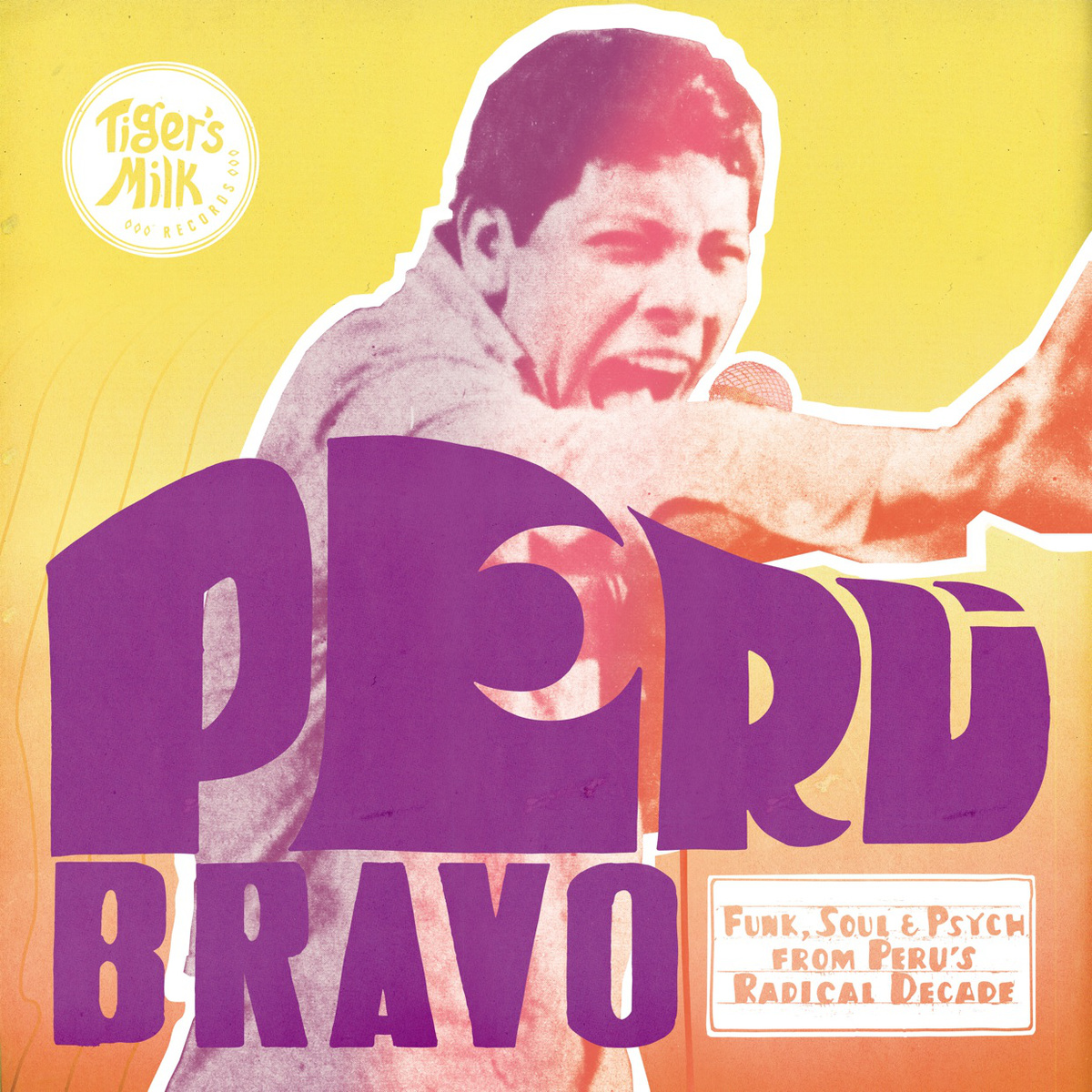Tiger’s Milk Records has established an impressive track record over the course of its short existence. Last year, the British label dropped its first release, the gorgeous cumbia/Latin/tropical compilation Peru Maravilloso. Release number two, Peru Bravo, turns to Peru’s psychedelic era. In the '60s and '70s, while some Peruvian artists were infusing cumbia with Western electric guitar sounds, another set of musicians shifted their emphasis towards rock and funk, pulling in influences from the Beatles and the Stones to Santana or the Impressions without losing their distinctive Peruvian flavor.
This movement grew just as Juan Velasco Alvarado’s military dictatorship took hold in 1968. That context is important for Peru Bravo, as Martin Morales, one of the album’s compilers, explained in an interview with Afropop: “Funk began in Peru with just a few bands who wanted to express themselves through this raw rhythm. They wanted to escape at times; at others, they wanted to scream about politics.” The compilation title, which means “tough" or "edgy” in Spanish, references this rebellious spirit.
That attitude is what ties Peru Bravo together, uniting a set of songs that spans from relatively straightforward takes on American psych or hard funk to songs with a stronger foothold in Peruvian styles. The album opener, “Bahia” from Laghonia, is an effects-heavy stunner that would sound at home on a future edition of a Nuggets compilation. Only the singing gives away its Peruvian origin: The lyrics are in English, but phrased in way that suggests that it is very much a second language. The song’s theme, about escaping to a magical imaginary world called Bahia, positions the group firmly among their worldwide hippy compatriots.
“Bahia” is followed by Traffic Sound’s “La Camita,” which overlaps more closely with the sound on Peru Maravilloso. Like Zulu’s “Sueño de Amor” on the first compilation, “La Camita” is in a kind of swinging mambo-lounge style, though Traffic Sound plays with a bit more rock ‘n’ roll swagger than Zulu. Next up is “Everything’s Gonna Change” by Jean Paul “El Troglodita,” whose nickname means “caveman” in Spanish. El Troglodita lives up to that title with wild, impassioned singing over a hard funk rhythm. Further along comes furious electric guitar and organ on the instrumental cumbia-rock track “Cacique” from the band of the same name. Like the famed chicha group Juaneco y su Combo (featured on Peru Maravilloso), Cacique alludes to the indigenous people of Peru, as the group's name is the title given by the Spanish to Indian chiefs throughout their empire.
Peru Bravo features two covers of American hits: a version of the Meters’ “Cissy Strut” from Los Holy’s and the Jimi Hendrix-popularized “Hey Joe,” covered by Jeriko. Los Holy’s recording of “Cissy Strut” is more psychedelic than the original, as the group plays it off-beat and includes a fuzzy Farfisa to pleasingly trippy effect. Jeriko's distinctive version of “Hey Joe” speeds up the song’s tempo and adds steady playing on the Peruvian hand drum.
One of the exciting developments documented in Peru Bravo is the way that the Peruvian artists mixed and mashed American genres in ways never imagined by their original creators. “Outasite” from Thee Image begins with doo-wop harmonies and ends with a fiery electric guitar finish rarely (OK, never) heard on Platters' singles. Los Texao’s “Sookie Sookie” (a cover of a Steppenwolf track) sounds like a hybrid of Funkadelic’s Eddie Hazel's guitar with singing reminiscent of MC5’s Rob Tyner.
Peru Bravo’s strongest connection to hippy culture belongs to Telegraph Avenue, a group formed by Bo Ichikawa, who spent half a year in San Francisco and named his band after the famous street that stretches from Oakland to Berkeley. On "Sungaligali," the band rocks with more righteous fury than most musicians from psychedelia’s epicenter. The compilation closer matches that high-voltage psych energy, though in more of a funky direction. That track, “El Sermón” by Los Comandos, perhaps named for the notoriously brutal military regime of Alvarado, is a fitting finale for Peru Bravo--a tough mixture of funk and psych garnished by some thrilling Peruvian pan flute.
Tiger’s Milk has, if anything, surpassed expectations on this follow-up to Peru Maravilloso. Next time, Martin hinted to us, we might be hearing the story of Peruvian punk, and judging from the label’s first two releases, that's something we definitely want to hear.









